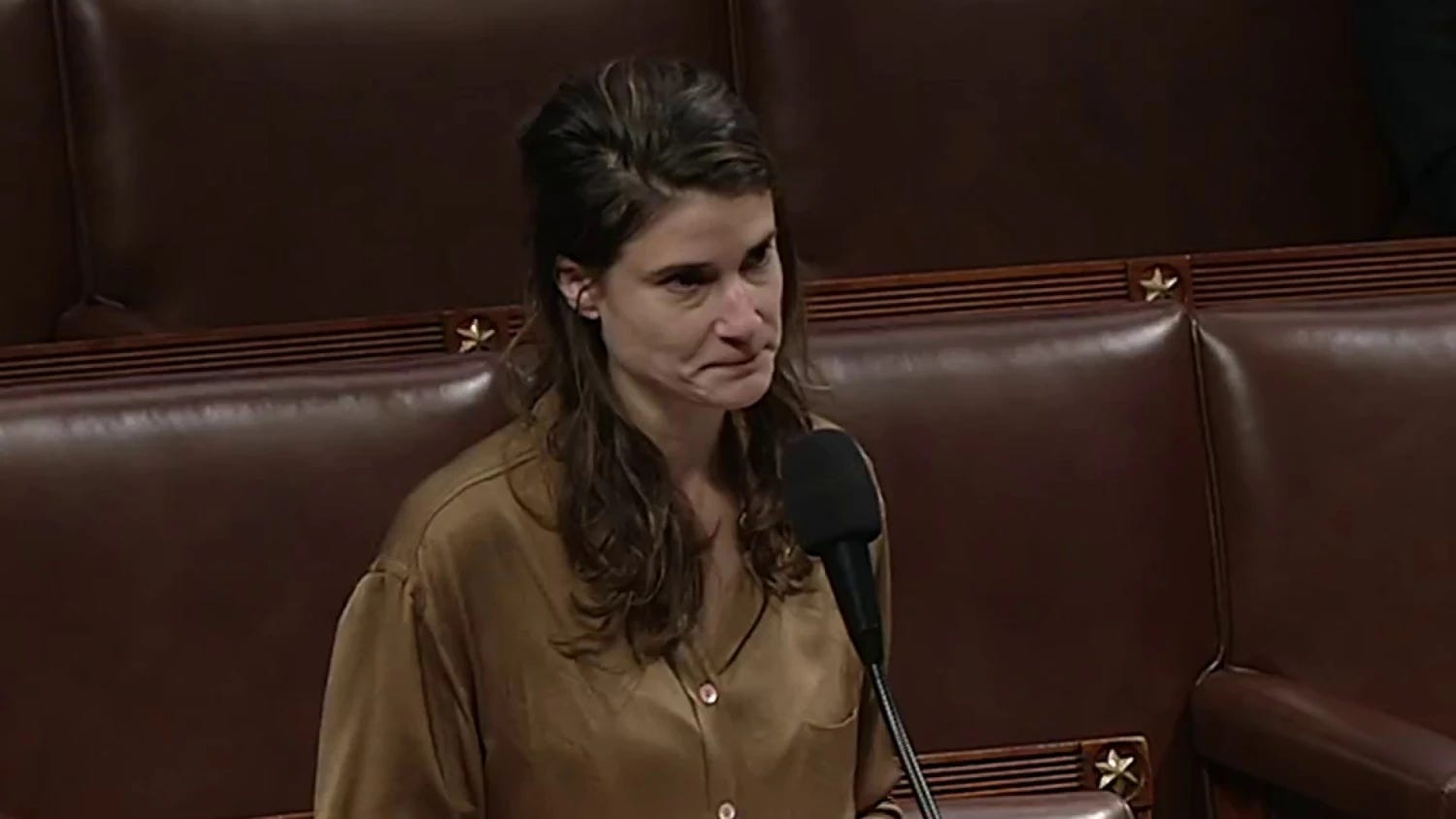“Sanctimonious”: Inside the blowback to Marie Gluesenkamp Perez’s rebuke of one of her own
Plus: Fetterman suffers a fall, AOC stands in solidarity with Starbucks workers and Democrats lament the U.S.’s absence at COP30.

FIRST THINGS FIRST
Marie Gluesenkamp Perez was one of six Democrats who voted with all but two Republicans on Wednesday night to pass a funding bill to end the longest shutdown in American history. But the second-term member’s vote turned out to be her least-surprising act of the evening.
Moments before lawmakers began casting their votes, Gluesenkamp Perez moved to force a floor vote in the House that would formally disapprove of her fellow Democrat Jesús “Chuy” García (Ill.) for his recent decision to retire rather than seek re-election—a choice she argues was designed to clear the way for his chief of staff to succeed him.
The resolution immediately drew mixed reactions from colleagues in both chambers and threatens to corrode the unity Democrats say they’ll need heading into major legislative fights in the final weeks of the year and the 2026 cycle, as the party looks to reclaim the House. The surprise nature of the resolution also summoned quiet concern from some Democrats who fear internal disputes could become distractions.
“My first thought was whether she even talked to him,” a House Democrat, who, like most other people mentioned in this story, spoke on the condition of anonymity to discuss internal caucus dynamics, said. “Who was she to reprimand him? Why now? It just seemed very sanctimonious, performative and unnecessary.”
A second member compared Gluesenkamp Perez’s move to that of a “Karen,” online shorthand for women who engage in an entitled form of behavior policing.
“It was inappropriate, untimely, not related to her district or state and arrogant as hell,” the member added. “Why is he any of her business? Her constituents didn’t vote for him.”
This member also drew parallels between Gluesenkamp Perez’s rebuke of García and Rep. Jared Golden (D-Maine), another Democrat who voted for the funding bill last night and criticized fellow Democrats in June for what he called “politics as theater” when he broke ranks over incidents involving Rep. LaMonica McIver (D-N.J.) and Sen. Alex Padilla (D-Calif.).
While none of the nearly dozen members and aides I spoke to while reporting this story were surprised by the timing of her filing the resolution, none seemed caught off guard by the act itself.
“She has never been a team player,” the first House Democrat said of Gluesenkamp Perez, who represents a Southwest Washington state district President Donald Trump won by three points in 2024. “And that’s not even about representing a Trump district because even Republicans seemed surprised.”
A spokesperson for Gluesenkamp Perez did not respond to a request for comment. When reached for comment, García spokesperson Fabiola Rodriguez-Ciampoli pointed to the statement his office issued on Wednesday and did not confirm whether the two lawmakers spoke before the filing.
A source familiar with the situation downplayed the significance of the resolution and anticipated that it would likely be tabled or withdrawn on Monday.
“It will depend on when the majority decides to bring it up,” Joy Lee, a spokesperson for House Minority Whip Katherine Clark (D-Mass.), told me in a statement. “House Democrats will work to table/defeat if needed.”
García’s compressed timeline—deciding to retire after filing, moving quickly to secure ballot access for his chief of staff Patty Garcia (no relation) and effectively clearing the field of any challengers—rippled through the caucus and left several Democrats describing the episode as abrupt and disorienting but up to the district’s constituents to decide if it’s disqualifying. But the sequence helped shape Gluesenkamp Perez’s decision to draft the disapproval resolution condemning how the transition unfolded, even as senior Democrats tried to dissuade her from moving forward.
Clark was seen in an extended conversation with Perez shortly before the filing, a moment many reporters initially misread as last-minute vote-wrangling on the government funding bill. In reality, the number-two House Democrat was urging against the resolution—a sign of how strongly leadership wanted to avoid an internal confrontation at a time when Democrats are dead set on mobilizing public support against Republicans for failing to address the looming health care cliff and broader cost-of-living concerns.
García told a local outlet last week that his decision to retire came together over the course of a tumultuous week in early November, when a stern warning from his cardiologist, a difficult conversation with his wife about her worsening multiple sclerosis and the formal adoption of a young grandchild solidified that he could no longer balance the demands of Congress with the needs of his family.
After several sleepless nights in Washington, he concluded he had to step aside and quickly moved to help his chief of staff qualify for the ballot, gathering signatures over the weekend. García acknowledged criticism that the timing limited the ability of other potential candidates, but said the circumstances were unexpected and personal and that he was following the filing calendar as best he could while responding to his family’s needs.
Still, for longtime Chicago observers, García’s eleventh-hour pivot inevitably echoes the city’s old political rhythms, where incumbents and ward organizations often shaped ballot access and successor choices behind the scenes. While García built his career as a reform-minded counterweight to the machine, his decision to step aside after filing—and to quickly marshal signatures for his top lieutenant—lands in a city where political lineage, timing and organizational muscle have historically determined who gets a real shot at running.
García’s exit also arrives at a moment when public trust in Congress and major institutions has sunk to historic lows, and when accusations of corruption, favoritism and insider dealing routinely shape voters’ perceptions across both parties. In the Trump 2.0 era—defined by ethical free-falls, blurred lines between public service and personal loyalty, and a sense that rules are enforced unevenly—even moves rooted in personal hardship can be interpreted through a lens of skepticism. Sources told me it’s this broader climate that makes García’s late-breaking announcement and swift effort to elevate his chief of staff more vulnerable to second-guessing, particularly in a city with Chicago’s political history, where timing and succession decisions have long carried outsized symbolic weight.
“Congressman Chuy García’s stated reasons for retirement are honorable, but his decision to anoint an heir is fundamentally undemocratic. This is the kind of thing that makes folks tune out of electoral politics. And frankly, who’d blame them?” Gluesenkamp Perez said in a statement after she filed the resolution. “If we fail to hold our colleagues accountable for this subversion of elections, we own the consequences. Americans bled and died to secure the right to elect their leaders. We can’t expect to be taken seriously in the fight for free and fair elections if we turn a blind eye to election denial on our side of the aisle.”
Sen. Andy Kim (D-N.J.), who toppled his state’s political machine on his way to his election to the Senate last year, agreed with Gluesenkamp Perez’s resolution.
“Standing against corruption means standing up no matter which political party violates,” he said on X. “The House should condemn and steps need to be taken to restore the people’s right to choose.”
But it was members of García’s own delegation who mounted the fiercest defense.
“It is disappointing that someone willing to compromise working families’ health care would use this moment for a cheap political stunt aimed at distracting people from an indefensible vote on tonight’s CR,” Rep. Delia Ramirez (D-Ill.) said, referring to Gluesenkamp Perez’s support for the government funding bill.
Rep. Jonathan Jackson (D-Ill.), who unsuccessfully attempted to speak without recognition against the resolution and in defense of García, said Gluesenkamp Perez demonstrated a lack of decorum in what he said should have been a night of unity that turned into a political stunt.
“Some people need to learn how to stay in their lane.”
LOOKING AHEAD
The House is out on Friday. It will meet on Monday at 12 p.m., with votes likely scheduled at 6:30 p.m. The Rules Committee will meet at 3 p.m. to prepare several bills for floor consideration, including bills to promote the use of natural gas, denounce socialism, reform D.C.’s cash bail system and a trio of Bureau of Land Management disapproval resolutions.
The Senate is out on Friday. It will meet on Tuesday at 3 p.m. and vote at 5:30 p.m. to end debate on the nomination of Ho Nieh to be a member of the Nuclear Regulatory Commission.
IN THE KNOW
Fetterman hospitalized after fall tied to heart-rhythm episode
Sen. John Fetterman (D-Pa.) was taken to a Pittsburgh hospital earlier today after collapsing during a morning walk near his home in Braddock. His office said the episode was triggered by a ventricular-fibrillation flare-up—an irregular heart rhythm that left him light-headed before he fell and hit his face, suffering minor injuries. Fetterman is staying for observation while doctors adjust his medications. The incident is the latest in a series of health challenges that have followed his 2022 stroke, which continues to shape both his physical recovery and the way he manages the demands of Senate life. A spokesperson said he’s in good spirits, joking about the bruising and thanking EMTs and hospital staff for their care.
Pelosi, House climate coalition blast U.S. absence from COP30
Speaker Emerita Nancy Pelosi (D-Calif.) and members of the House Sustainable Energy and Environment Coalition warned on Thursday that the United States’ failure to participate in COP30 marks a dangerous step backward in the fight against global warming. With President Trump refusing to send a federal delegation—and the GOP-driven government shutdown and floor schedule making it impossible for Democratic members to attend independently—America is effectively absent from the world’s premier climate summit for the first time in decades.
The lawmakers argued that the nation’s retreat leaves a vacuum in global climate negotiations at a moment of escalating heat waves, extreme weather and scientific urgency, underscoring how Trump’s second-term climate posture—abandoning international commitments, sidelining federal climate science and prioritizing fossil fuel expansion—has already reshaped the country’s role on the world stage. They vowed to continue working in Congress to advance policies that secure a livable planet for future generations.
AOC backs Starbucks workers as strikes widen amid stalled labor talks
Rep. Alexandria Ocasio-Cortez (D-N.Y.) voiced support this morning for Starbucks workers who walked off the job as part of a national strike aimed at pressuring the company to resume stalled contract negotiations. The action comes after years of worker complaints about unpredictable schedules, chronic understaffing, low wages and what the National Labor Relations Board has repeatedly described as unfair labor practices. Starbucks Workers United has organized more than 400 unionized stores since 2021, but the company has yet to reach a first contract with any of them—fueling the latest round of coordinated strikes.
House Dems demand briefing on ICE agent impersonators
House Homeland Security Committee Democrats pressed Department of Homeland Security Secretary Kristi Noem and FBI Director Kash Patel in a letter for a briefing on a newly reported FBI directive that warns criminals are posing as Immigration and Customs Enforcement agents. The memo cites multiple instances across states in which individuals wearing ICE-branded gear or claiming to be ICE officers carried out violent crimes, including robbery and assault. The Democratic lawmakers argue the practice is eroding public trust, especially among immigrant and vulnerable communities, and want immediate clarity on how the DHS plans to implement the FBI’s recommendations.
Senate Dems push to reinstate suspended export safeguard
Sen. Ron Wyden (D-Ore.) led a group of Senate Democrats in a letter formally objecting to the White House’s suspension of the Bureau of Industry and Security's “affiliates rule,” which closed a major export-control loophole allowing foreign firms linked to black-listed entities to access advanced U.S. technology. The letter argued that bargaining away the measure in the name of talks with China threatens national security, opens the door to restructuring by bad actors and adds compliance uncertainty for U.S. firms. The senators called on the administration to reinstate the rule and stop treating high-stakes security tools as a trade chip.
Senate Dems move to rein in Trump’s domestic troop deployments
A group of Senate Democrats introduced new legislation to curb President Trump’s expanding use of the military inside the United States. The No Troops in Our Streets Act would give Congress a fast-track mechanism to block any domestic deployment of the National Guard ordered by the White House, while steering $1 billion to state and local law enforcement to bolster public-safety efforts. The bill comes after Trump sent or attempted to send thousands of federalized Guard troops into cities like Los Angeles, Portland and Washington, D.C., often over the objections of governors and mayors—and after renewed threats to use the 1807 Insurrection Act for arrests and raids. The proposal wouldn’t touch state-ordered Guard deployments, disaster responses or routine military support missions, but it would put new guardrails around the president’s authority to send federal troops into American communities.



